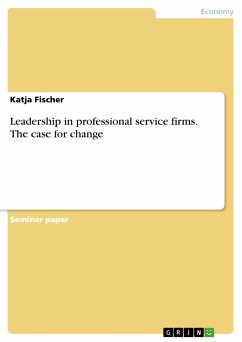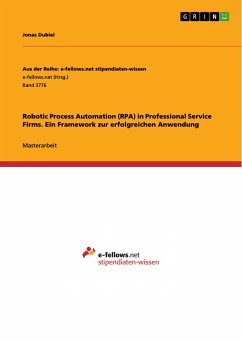Seminar paper from the year 2016 in the subject Business economics - Business Management, Corporate Governance, grade: 1,3, University of applied sciences, Cologne, course: Master of Business Administration - Soft Skills and Leadership Methods, language: English, abstract: The following assignment consists of a theoretical overview about leadership and the characteristics of professional service firms as well as an analysis of the existing leadership model in professional service firms and the case for change in this topic. Starting with the general definition of leadership, the assignment shows two different leadership models. On the one hand the assignment illustrates the situational leadership developed by Paul Hersey and Kenneth H. Blanchard and on the other hand the full range of leadership models adapted from Bass & Riggio. In the next part the specific characteristics of professional service firms are illustrated, including the governance form and the knowledge as one primary asset. In this part the first theory-praxis transfer is made through analyzing the current leadership model using the situational leadership as well as the full range of leadership models. The characteristics of professional service firms leads in the next chapter which deals with the existing changes and uncertainty in the market and the facing challenges for professional service firms which need to be managed. In this context of change, challenges and the existing talent war leadership is one of the primary factors for the success of these firms. Therefore the theory-praxis transfer is made through the alignment of the illustrated leadership models and the characteristics of professional service firms in relation to the facing challenges. The alignment shows that the existing business model of professional service firm has to change in different components including the organizational structure as well as the common leadership model. Without changing the approach of leadership or even without any leadership professional service firms will lose their talents, carrying their specific knowledge to competitors. The conclusion closed with a recommendation of a leadership model as well as relevant factors for a successful implementation considering the specific governance form of professional service firms especially the powerful position of partners.
Dieser Download kann aus rechtlichen Gründen nur mit Rechnungsadresse in A, B, BG, CY, CZ, D, DK, EW, E, FIN, F, GR, HR, H, IRL, I, LT, L, LR, M, NL, PL, P, R, S, SLO, SK ausgeliefert werden.









